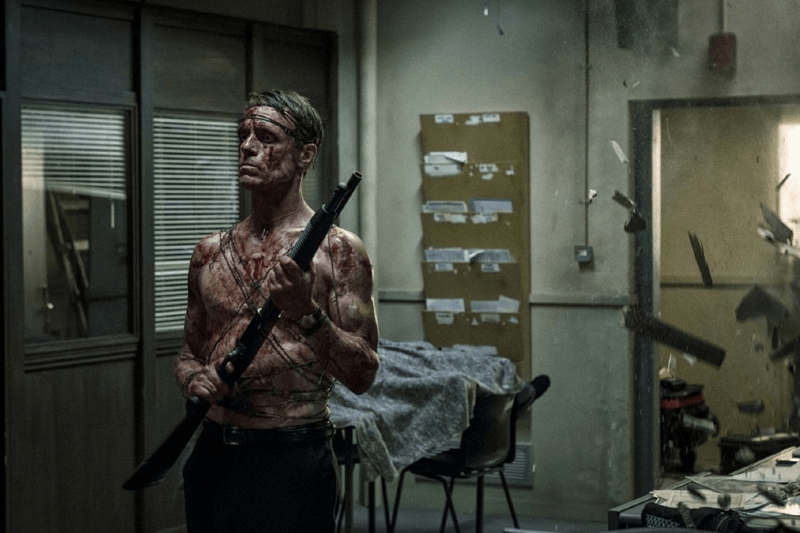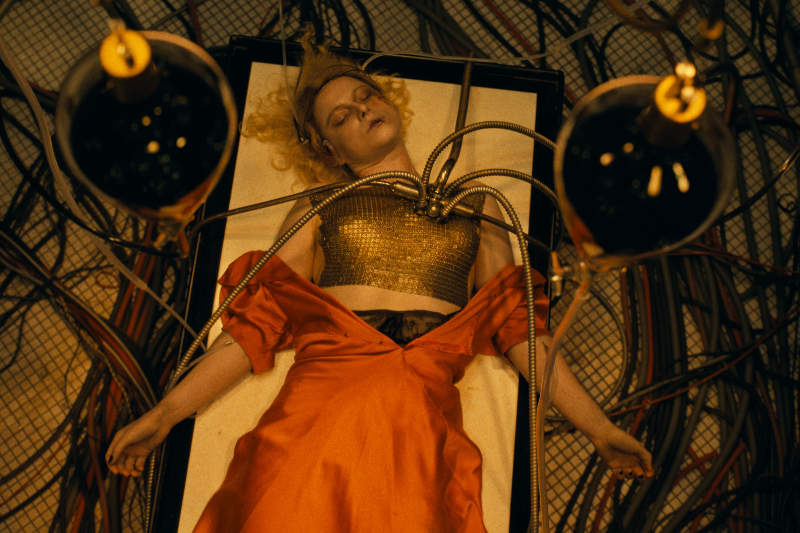The Devil is a formative monster in the horror genre. Often a personification of evil, the deity — also known as Satan, Lucifer, Beelzebub, Mephistopheles, and even Old Splitfoot — is said to be a fallen angel, cast out of heaven for challenging God. Or at least that’s the Judeo Christian understanding of the archetype.
Many occult practitioners view the Devil as, among other things, an agent of chaos. They are a manifestation of toxic control or even a liberator of women from a staunchly patriarchal belief system. Horror has seen many different portrayals of the Devil ranging from the ultimate evil to a misunderstood outsider. Brian O'Malley’s 2014 film Let Us Prey offers a more sympathetic interpretation in Six (Liam Cunningham), a mysterious stranger who wreaks havoc on a small Scottish police station.
Though never explicitly called Satan, Six is something of an anti-hero, collecting the souls of the wicked before the stroke of midnight. This interpretation of the Devil as an avenging angel offers an interesting exploration of forgiveness and retribution. The deal he eventually offers Rachel (Pollyanna McIntosh), a young police officer who once asked for his help, depicts Satan as a force for good in an evil world.
PC Rachel Heggie is headed to her first shift at a remote Scottish police station when she witnesses what appears to be a hit and run accident. Though the victim vanishes at the instant of impact, she sees blood on the headlights and arrests teenage delinquent Caesar (Brian Vernel) for reckless driving.
She reports for duty, but her night does not improve.
When not accusing Rachel of insubordination, her commanding officer Sgt. MacReady (Douglas Russell) riles up the prisoners then abandons her at the station. Fellow PCs Mundie (Hanna Stanbridge) and Warnock (Bryan Larkin) mock her commitment to the job before ignoring her in favor of their not-so-secret affair. The partners return from their canoodling with Cunningham’s mysterious stranger in tow. Spooked by his icy demeanor and refusal to identify himself, Sgt. MacReady locks him in cell number six, establishing his devilish nickname.
From behind bars, Six begins to collect the souls of his fellow prisoners using a magical box of matches to orchestrate their deaths. First on his list, Mr. Beswick (Jonathan Watson) is an abusive husband who suddenly begins slamming his head against the bars of his cell as if guided by unseen hands. Second is Dr. Hume (Niall Greig Fulton), a doctor who brutally murdered his family in experiments designed to locate the soul within the body. Six manipulates PC Warnock’s emotions and incites the officer to murder Dr. Hume with the leg of a table from the interrogation room. The blood on Caesar’s headlight was not from Six, but from an earlier accident in which he hit a pedestrian and left her to die in a ditch by the road. One by one, Six confronts them with their sins and adds their names to his diabolical book.
But Six’s harvest does not end with the prisoners. Mundie and Warnock are both guilty of beating and murdering a suspect then staging the crime scene to look like a suicide. After Warnock murders Dr. Hume, the couple plan to pin it on Rachel, using her past trauma as a motive.
Sgt. MacReady is also guilty of horrific crimes. Once confronted by Six, he returns to his blood-soaked home and begins to dispose of the dismembered body in his refrigerator along with the beaten and nearly dead lover lying in a pool of blood on his bed.
Charged with protecting the innocent, the officers’ hypocrisy is almost as egregious as their crimes. Simply trying to do her job, Rachel is appalled at the behavior of her fellow officers and put in danger when Sgt. MacReady returns shirtless and wrapped in barbed wire. Carrying a shotgun, he prepares to set the whole precinct ablaze in a murderous frenzy.
The only innocent soul is Rachel, who suffers horrific flashbacks from her past. As a young girl, she was kidnapped and tortured by a serial child murderer. Having managed to free herself, she is stunned to see the front door open and unguarded and runs through it to freedom. It seems Six has responded to her desperate pleas for help and collected the soul of her kidnapper, thus allowing her to escape. As Rachel’s rescuer, Six becomes an anti-hero, his actions recast as virtuous.
How many additional children would have been murdered if not for his intervention? One could also ask how many people he’s saved by collecting the souls in Rachel’s precinct. Beswick’s wife will never be beaten again. Mundie and Jack will never murder another suspect. By igniting MacReady’s fiery rampage, he has essentially rid the town of a police force that poses a greater threat than the criminals they’ve incarcerated.
Six can also be compassionate, occasionally even offering a chance for redemption. Knowing that Caesar's victim is still alive by the road, Six encourages him to confess before it’s too late. The teenager has remained silent, fearing that admitting to the first hit and run will land him in even more trouble, but Six reminds him that he is on the brink of eternal damnation — the worst kind of trouble.
Though he never identifies himself as the Devil, Six does hint at his heavenly origins. He mentions being cast out after a disagreement with a friend, likely God, over grace and salvation. Six rejects the command to ignore and condone the sins of the world. He is only interested in retribution, preying on transgressors rather than waiting for them to pray for forgiveness.
Contrary to many understandings of the Devil, Six is not the cause of their sins. He is merely a witness to corruption and relishes the chance to do some good on Earth. After identifying himself as Rachel’s rescuer, he offers her a choice: remain in her life under the thumb of the wicked or join him as Queen of Hell, punishing sinners all over the world. It’s a tempting offer for a survivor of such profound trauma. While being held captive, Rachel begged for the kind of help Six offers. Perhaps she got tired of praying for salvation and tried a more direct approach. Rachel may have chosen a career in law enforcement to protect others from similar abuse, but seeing the corruption inside her precinct, the idea of making effectual change now seems unlikely. Six offers her a chance to rid the world of people like her kidnapper and a way to save others the way Six once saved her.
At the stroke of midnight, Six harvests the souls on his list. He has done what years in law enforcement could not and rid the world of unrepentant sinners. Though an argument could be made that even the worst criminals deserve forgiveness, he does offer them a chance at redemption, only collecting them when it’s clear they intend to cause more harm. How many victims would they have racked up before seeing the error of their ways? How many innocents has he saved?
Seeing a chance to do good on Earth, Rachel accepts his offer and the two form a devilish partnership. Together, they will rule Hell, walking the earth as anti-heroes and collecting the souls of sinners. Salvation of the innocent will be a byproduct of their actions to rid the world of evil. They will be unholy warriors preying on the wicked in defense of the just.






